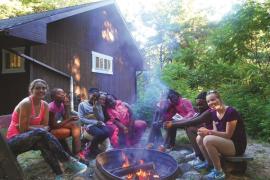How many texts did you send yesterday? How about e-mails? Did you tweet any of your opinions? Was this distracting to you or anyone else? Were you misunderstood or did you get your point across? These questions and many resembling them are common concerns for people who are faced with a community living situation like day or resident camp. Last summer, while conducting camp staff trainings, I noticed an alarming trend in staff communication behavior. Extremely dangerous situations were created because staff sometimes reacted more to texting, phone calls, and Twitter than to immediate camper needs.
The benefits of social media are undeniable, and for many people, it has become a primary method of communication. According to Chenda Ngak (2012) of CBS News, text messaging is the top means of communication among teens with 63 percent of teens sending messages every day. Only 39 percent reported making phone calls daily, and only 35 percent say they communicate face-to-face. However, until we learn how to fully integrate this ever-changing technology into our lives, let us not forget the important fundamentals of social interaction and how they affect children.
Kim Schneiderman (2013) recently published an article in Psychology Today that cited the work UCLA professor Albert Mehrabian did on communication. His research revealed that 58 percent of communication is through body language; 35 percent through vocal tone, pitch, and emphasis; and a mere 7 percent through the content of the message. If you want to be understood by other camp staff and campers, why would you risk the importance of what you are saying by only using 7 percent of your expressive potential?
Imagine trying to have a “normal” camp day if campers could only use 7 percent of the pool, 7 percent of the dining hall, or 7 percent of the cabin. How much of the camp experience would be lost if each resource was not operating at its full potential?
Do you know what each camp’s number-one resource is? Go look in the mirror. You are the link between a piece of property with activity sites and a life-changing experience.
Most camps have philosophies that specifically identify making friends or establishing personal connections as a goal. Camp, by definition, is a community-based environment where learning occurs through a process of carefully designed, age-appropriate experiences. Because the length of each camp program differs, staff must be aware of how much time they have to establish a meaningful relationship with each camper. This time is to be cultivated and cherished!
The most important thing you can do in camp is get to know your kids. Pay attention to their needs, and make it a goal to help them create lasting friendships. For some campers, this can be a long and complex process. It takes a lot of situational awareness to meet this goal, so being able to accurately assess your own style of communication is critical to your success.
Before you begin to work with your campers, you should know that parents have a very different perspective of camp than you do. When asked what their expectations of camp are, parents typically want a safe, organized, accredited program led by well-trained staff who will teach skills while having fun. Staff, on the other hand, expect to be tired, anxious, excited, sometimes scared, socially hopeful, immersed in fun — all while hanging out with other staff. This HUGE dilemma can be resolved, but it will require you to evaluate your own communication style and see if it is conducive for the management of children.
Your success in camp as a staff member will largely be based on your ability to cultivate quality relationships — both camper and staff. Many camps do not allow electronics to be used except during designated times, while others have more specific policies depending on the activities being offered. In any case, if you normally depend on tweets and texts to communicate, you will likely have to accept a new set of rules during camp. Do not take this personally. You may need to redefine your role as a leader of children by learning or concentrating on social interaction skills. If you have trouble with this transition, you may become frustrated or feel misunderstood. Acquiring and maintaining face-to-face communication skills should be a critical mission for all counselors. What is the easiest way to accomplish this?
Superstar Counselors
Learning how to pace yourself while being consistent in group leadership techniques is a challenge. It can be difficult to prioritize all the different issues camp presents, so knowing how to concentrate your efforts will be helpful.
A simple formula will help you know how to divide your time.
SC = P + VS + PRS ÷ C
SC = Superstar Counselors
P = Philosophy
VS = Value System
PRS = Positive Relationship Skills
C = Commitment
SC = P+VS+PRS
C
The three concepts (Philosophy, Value System, and Positive Relationship Skills) in the numerator should be the foundation you use to create a successful camp experience. When identifying characteristics of Superstar Counselors, they all have the ability to incorporate different aspects of the counselor trilogy into their daily routines. Each one finds a way to blend in personal needs/wants with camp goals. This is not a part-time strategy because leading campers demands your full-time effort.
Your success in implementing these ideas requires a significant commitment, which is then divided into each category as needed. You are not expected to give up your entire personal life just because you work at camp. Prioritizing and multitasking messages are extremely important because outside issues will affect your job performance. To be an effective leader, you must create a consistent philosophy that will be evident by the way you manage your group or activities. The guiding force in this process will be the values you instill in the group, bunk, or cabin. Campers will learn from your actions; be purposeful in your interactions with others by providing positive examples of personal communication.
You are in a unique position of leadership because you are figuring out the complexities of life just ahead of the campers. Teens can be the most confused group of campers because they are growing up in a world where texting has always existed, and sometimes, nuances of personal interaction have been lost. Since camp staff do not have their parents in camp, directors often take the place of authority. In her book, Raising Teens, Dr. A. Rae Simpson (2001) from the Harvard School of Public Health says teens frustrate parents (or staff) because they want to be with them, except when they don’t; they want to help, except when they don’t; and they behave in excitingly more mature ways, except when they don’t. While there are many reasons that explain this phenomenon, your job is to teach campers healthy ways to communicate without compromising their self-esteem.
Messages to Upload
So what kind of messages should you upload? Let’s start first with a premise that meaningful relationships must have some sort of connection. Replace texting with examples of how a deeper sense of bonding can occur when typical relationship boundaries are understood. Help campers practice their communication skills throughout the day and especially during activities, in the dining hall, and during unstructured free time (which may be the most crucial time of all). By implementing a proven strategy for group harmony, you will begin to gain your campers’ trust.
These powerful connection lessons may overlap, but they will serve as a proper foundation for healthy learning. Plan to involve yourself in all of their activities, which allows you to implement a firm yet sensitive technique when managing the group. Use the camp’s program areas to guide your campers through a path of self-discovery. The more they learn about life, the more empowered they will feel. Show unconditional support for their achievements by telling them specific examples of when they exhibit outstanding behavior. Finally, be aware of your group’s position within the camp community. Make sure they understand the actions they take will have an effect on the rest of camp.
You must find a balance between how much of your day you need for you and how much you can give to the campers. Checking electronic messages frequently (“precamp mode”) will need to be replaced with a conscious decision to put the campers first (“in-camp mode”). Many campers will be used to checking phones as well, so you must replace this urge with some intentional messaging of your own.
- Ask lots of open-ended questions and let your campers come up with answers.
- Be sure to talk about sensitive issues away from the group so a camper’s business remains private.
- Try not to get into power struggles by allowing your campers to complain about things they do not want to do.
- Remember, campers are rapidly changing through ages and stages. Quickly determine what the norm is for that age and focus on realistic achievements.
- Show your campers trust when you can by respecting their space, their body, and their emotions.
- Watch for activities that are over stimulating and be understanding when honest mistakes are made.
- Practice mindfulness. Be in the moment by paying attention to what they are doing and not what you want to do.
- Understand everyone’s world is filled with constant information. Campers will get it one way or the other. Finding a balance between social media and face-to-face communication is a valuable lesson learned.
- Camp is a self-contained community and lots of information sharing will cut down the need for texting.
Camp Is a Community
Camp is a community that relies almost exclusively on personal interactions for learning. Your big challenge this summer will be to replace texting and other forms of electronic communication with the face-to-face, interpersonal social skills necessary for campers to be understood.
By using the Superstar Counselor formula, you will be able to know how much time you need to devote to each category by adjusting your level of commitment. Cultivate camper connections using a deeper bonding method of communication, which can be practiced during activity times. Finally, look for a daily balance in your personal life. Be proactive on sensitive camper issues and help them to understand the value of the camp experience by mastering the complexities of social interaction.
Discussion QuestionsReferencing the Superstar Counselor formula above, discuss the following:
|
References
Ngak, C. (2012 March 19). Teens are sending 60 texts a day, study says. CBS News. Retrieved from www.cbsnews.com/8301-501465_162-57400228-501465/teens-are-sending-60-texts-a-day-study-says/
Schneiderman, K. (2013 January 21). The trouble with texting. Psychology Today. Retrieved from www.psychologytoday.com/blog/the-novelperspective/201301/the-trouble-texting
Simpson, A. R. (2001). Raising teens: A synthesis of research and a foundation for action. Boston, MA: Center for Health Communication, Harvard School of Public Health, p. 41.
Greg Cronin of GC Training Solutions is a certified camp director and staff trainer with over thirty years of staff training experience. For more information on consultant services, trainings, workshops, conferences, or articles, please visit www.GCtrainingsolutions.com. To contact Greg directly, please call 703.395.6661 or e-mail [email protected].
Originally published in the 2013 May/June Camping Magazine.


